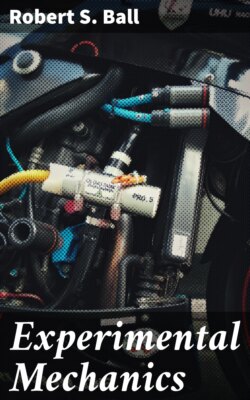Читать книгу Experimental Mechanics - Robert S. Ball - Страница 6
На сайте Литреса книга снята с продажи.
THE DEFINITION OF FORCE.
ОглавлениеTable of Contents
2. It is necessary to know the answer to this question, What is a force? People who have not studied mechanics occasionally reply, A push is a force, a steam-engine is a force, a horse pulling a cart is a force, gravitation is a force, a movement is a force, &c., &c. The true definition of force is that which tends to produce or to destroy motion. You may probably not fully understand this until some further explanations and illustrations shall have been given; but, at all events, put any other notion of force out of your mind. Whenever I use the word Force, do you think of the words “something which tends to produce or to destroy motion,” and I trust before the close of the lecture you will understand how admirably the definition conveys what force really is.
3. When a string is attached to this small weight, I can, by pulling the string, move the weight along the table. In this case, there is something transmitted from my hand along the string to the weight in consequence of which the weight moves: that something is a force. I can also move the weight by pushing it with a stick, because force is transmitted along the stick, and makes itself known by producing motion. The archer who has bent his bow and holds the arrow between his finger and thumb feels the string pulling until the impatient arrow darts off. Here motion has been produced by the force of elasticity in the bent bow. Before he released the arrow there was no motion, yet still the bow was exerting force and tending to produce motion. Hence in defining force we must say “that which tends to produce motion,” whether motion shall actually result or not.
4. But forces may also be recognized by their capability or tendency to prevent or to destroy motion. Before I release the arrow I am conscious of exerting a force upon it in order to counteract the pull of the string. Here my force is merely manifested by destroying the motion that, if it were absent, the bow would produce. So when I hold a weight in my hand, the force exerted by my hand destroys the motion that the weight would acquire were I to let it fall; and if a weight greater than I could support were placed in my hand, my efforts to sustain it would still be properly called force, because they tended to destroy motion, though unsuccessfully. We see by these simple cases that a force may be recognized either by producing motion or by trying to produce it, by destroying motion or by tending to destroy it; and hence the propriety of the definition of force must be admitted.
